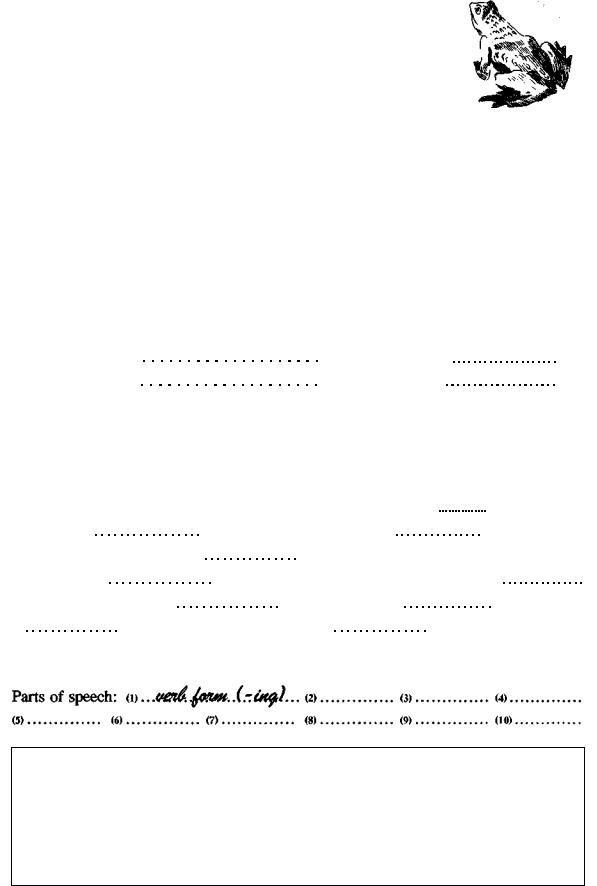
4
.pdf
202 Useful Exercises for IELTS
1.4T E N S E S : Choose the correct words or phrases that are missing in the following sentences, paying attention to the correct tense required:
i. |
Nobody believes that investment in telecommunications |
lose money. |
|||
|
a) |
has ever |
c) |
would ever |
|
|
b) |
had ever |
d) |
will ever |
|
ii. |
After |
her lunch, the teacher began marking the essays. |
|
||
|
a) |
finished |
c) |
finishing |
|
|
b) |
had finished |
d) |
having finish |
|
iii. |
The student |
very well in her first practical examination. |
|||
|
a) |
did |
c) |
had done |
|
|
b) |
has done |
d) |
all of the above |
|
iv. It is hard to know why undergraduates |
help with their assignments. |
||||
|
a) |
fail to seek |
c) |
are not seeking |
|
|
b) |
will not seek |
d) |
all of the above |
|
v. |
Most of the general public |
|
to see a live theatrical performance. |
||
|
a) |
have ever been |
c) |
are never wanting |
|
|
b) |
have never been |
d) |
all of the above |
|
vi.Sometimes it is necessary to be careful
a) when choosing |
c) |
b) when you will choose |
d) |
the right date to sit for a test. when you have choose
when you chose
vii. |
No-one who |
visited the Sydney Opera House is likely to forget it. |
|||
|
a) |
will have |
c) |
had ever |
|
|
b) |
would have |
d) |
has ever |
|
viii. |
If only the Prime Minister |
|
his arts policy would lose him the election. |
||
|
a) |
knows |
|
c) |
was knowing |
|
b) |
had known |
|
d) |
could have knowing |
ix. |
If writing skills |
so important, why do candidates not practise more regularly? |
|||
|
a) |
were |
c) |
are |
|
|
b) |
would be |
d) |
all of the above |
|
x. |
The better universities |
free classes to students with language problems. |
|||
|
a) |
offering |
c) |
should have offer |
|
|
b) |
is offering |
d) |
offer |
|
xi. |
The student |
studying at an institution when he had to return to his home |
|||
|
country unexpectedly. |
|
|
|
|
|
a) |
is considering |
c) |
should consider |
|
|
b) |
was considering |
d) |
has considered |
|
xii. |
The businesswoman |
dismissed because of her lack of politeness. |
|||
|
a) |
could be |
c) |
will be |
|
|
b) |
could have been |
d) |
all of the above |
|
(ANSWERS ON PAGE 113)
20

PART 1 - COMMUNICATION AND THE ARTS
VOCABULARY EXERCISES 1.1 - 1.3
1.1 SUFFIXES (1): Note the meanings of the 4 suffixes given in the box below. Then work out the approximate meaning of the words that follow before checking their meanings in a good dictionary:
ful |
= with |
able |
= can be, able to be, must be, |
less |
= without |
en |
= make |
artful masterful hapless
cashless society justifiable notifiable hearten enlighten
1.2SUFFIXES (2): Can you think of three more words ending with each of the suffixes listed in the exercise above?
1.3WORD FORMATION: Complete the chart to provide the correct form of the words shown for the given parts of speech: (Not all forms are possible.)
|
NOUNS |
|
ADJECTIVE |
VERB |
ADVERB |
|
|
|
|
||||
PLACE * |
PERSON |
GERUND/THING |
||||
|
|
|
||||
|
|
|
|
|
|
|
- |
|
|
|
write |
- |
|
|
|
|
|
|
|
|
- |
|
designing/design |
|
|
|
|
|
|
|
|
|
|
|
|
artist |
|
|
- |
|
|
|
|
|
|
|
|
|
- |
|
|
communicative |
|
• |
|
|
|
|
|
|
|
|
- |
- |
expression |
|
|
|
|
|
|
|
|
|
|
|
- |
- |
|
|
mean |
|
|
|
|
|
|
|
|
|
|
informant |
|
|
|
|
|
|
|
|
|
|
|
|
- |
- |
|
explanatory |
|
- |
|
|
|
|
|
|
|
|
- |
- |
|
|
conclude |
|
|
|
|
|
|
|
|
|
development |
|
|
|
|
- |
|
|
|
|
|
|
|
|
- |
- |
|
|
|
encouragingly |
|
|
|
|
|
|
|
|
double word nouns are possible |
|
|
|
|
||
|
|
(ANSWERS ON PAGE 113) |
|
|||
21

202 Useful Exercises for IELTS
LISTENING EXERCISES 2.1 - 2.9
2.1SPEED LISTENING: Note only the essential details of what you hear: (Refer to the tapescript for confirmation.)
a.Cardiff has
b.This city
c.Wales
d.More than
e.Nuclear
f.The major
g.Cardiff
h
i
j
2.2 NUMBERS AND LETTERS: (Refer to the tapescript for confirmation.)
A |
i |
ii |
iii |
iv |
v |
|
vi |
vii |
viii |
ix |
x |
B |
i. -x |
|
|
|
|
C i |
ii |
iii. ... |
iv. . |
|
v |
vi |
|
vii. ... |
viii. |
|
|
ix |
x |
|
|
|
|
D |
i |
ii. |
iii. .. |
iv |
v. |
|
vi |
vii. |
viii. .. |
... ix |
X |
||
|
2.3GENERAL INFORMATION: Listen to Radio Items 3 & 4 and complete the chart with the basic details: (Refer to the tapescript for confirmation.)
What? Where? When? Who? How? Why?
Radio
Item 3
Radio
Item 4
22

PART 2 - THE ENVIRONMENT
2.4 G A P F I L L : |
Listen to Radio Item 3 again and complete the gaps in the |
|||||
summary of the passage below with the correct word or phrase you hear: |
||||||
The Earth's surface is two-thirds |
water, yet most |
of this is undrinkable or unusable |
||||
because it |
is |
either seawater or |
(1) |
Of the |
1% that is |
available as |
(2) |
|
water, most is used for (3) |
or goes to industry. |
Freshwater |
||
contamination is the major problem since it is all too easy to pollute rivers and streams |
||||||
with pesticides, industrial waste, and (4) |
In |
poor and (5) |
|
|||
countries, the addition of sewage to sources of water leads to (6) |
|
and death. |
||||
In China, |
a United Nations report estimates that |
over 78% |
of people |
drink from |
||
(7) |
|
water supplies. Although humankind has made enormous efforts to control |
||||
the supply of fresh water by constructing more than (8) |
dams throughout the |
|||||
world, falling water (9) |
, shrinking rivers and lakes, and loss of wildlife are the |
|||||
result. School project kits are available by telephoning this number: (10) |
|
|||||
2.5MULTIPLE CHOICE QUESTIONS: Listen to Radio Item 4 one more time and answer the following questions:
i.Residents believed the explosions were:
a)caused by gas
b)caused by storms
c)planes nose-diving into the sea
d)all of the above
ii.Professor Blunt was asked to help by:
a)the University of Queensland
b)the Shire Council
c)the Biology Department
d)the Port Charles resort
iii.The problem's solution involves:
a)blasting the jellyfish out of the sea
b)trapping jellyfish in the rock shelf
c)changing the patterns of the tides
d)none of the above
iv.More than half the rock shelf:
a)will remain
b)will be blasted away
c)is the result of global warming
d)is protected by environmentalists
2.6 SPECIFIC INFORMATION: Listen again to the radio items:
i. What is the name of the environmental radio programme?
ii. What are you told about the distribution pattern of fresh water in the world?
iii.What percentage of fresh water is available for personal use?
iv.What do rivers and streams feed that supply us with fresh water?
v.Why are trees, plants and wildlife at risk?
i. Where did the explosions take place?
ii. What does the town rely on for its survival? (oil rigs? fishing? etc.)
iii.What can you no longer do in the waters off Carrsville?
iv.What is Professor Blunt's solution to the problem?
v.For what is global warming thought to be partly responsible?
23
202 Useful Exercises for IELTS
2.7 PREDICTION AND PREPARATION: In True/False question tasks
it is sometimes possible to predict the likely correct answers based on either your common knowledge or on logic. (Of course, it is impossible to determine beforehand if something is not given.)
Look at the questions in Exercises 2.8 and 2.9 and try to predict what you will hear on the tape. Ask yourself:
-who is talking and possibly to whom?
-what is the topic that is to be discussed?
Circle the keywords and phrases to listen for. Guess the answers to the True/False/ Not Given questions before you listen, and later check your accuracy.
2.8 TRUE / FALSE / NOT GIVEN: Listen to Lecture 2 on the tape:
a. |
We live in the most technologically advanced period in history. |
T |
F |
NG |
b. Greenpeace will probably continue to keep a close watch on |
T |
F |
NG |
|
|
government policies. |
|
|
|
c. |
The levels of Greenhouse gases will soon decrease. |
T |
F |
NG |
d. The environment was not always considered an important |
T |
F |
NG |
|
|
political issue. |
|
|
|
e. |
'Green' parties are mainly supported by young voters. |
T |
F |
NG |
f. |
Hardwood forests are being destroyed for long-term profit. |
T |
F |
NG |
g. The best recipe for environmental protection is poverty. |
T |
F |
NG |
|
h. |
Technology and economic growth assist conservation. |
T |
F |
NG |
i. |
There will soon be soon be cheaper food and cleaner cars. |
T |
F |
NG |
j. |
The environment will benefit if we help the economy to grow. |
T |
F |
NG |
2.9 SHORT-ANSWER QUESTIONS: Refer to Lecture 2 on the tape.
All the answers below have a MAXIMUM NUMBER OF FOUR WORDS:
i.
At the start of the new millenium, what is beginning to be reversed?
ii.
Two 'watchdog' organisations are named. Greenpeace and
iii.
According to the speaker, what is the most encouraging sign?
iv.
What is given as a direct cause of 'environmental ruin'?
v.
Which high-tech solution is given that will conserve natural resources?
(ANSWERS ON PAGE 114)

PART 2 - THE ENVIRONMENT
READING EXERCISES 2.1 - 2.11
2.1 P R E D I C T I O N : Look at the illustration below and the words and phrases taken from the Reading Passage on the next page. With a partner if possible, try
to predict exactly what is being discussed: |
|
have not seen one |
development of once natural areas |
|
|
coming environmental disaster |
theory |
sensitive to environmental |
disappearing from rainforests |
variations in temperature |
|
|
species |
losing the ecological battle |
|
at a loss to explain |
no obvious reasons why |
|
|
increase in ultraviolet radiation |
upsetting the breeding cycles |
warning us of a catastrophe |
temperature increases |
may have already become irreversible
 2.2 P R E - R E A D I N G Q U E S T I O N S : Before reading the text on the following page, work with a partner and ask and answer the questions below. Base your answers on your possible knowledge of the topic:
2.2 P R E - R E A D I N G Q U E S T I O N S : Before reading the text on the following page, work with a partner and ask and answer the questions below. Base your answers on your possible knowledge of the topic:
What words would you use to describe frogs and toads?
Why do you think one is less likely to come across a frog these days?
What are the usual colours of frogs? Why?
How might frogs be warning us of climate changes?
Do you know what role frogs play in the ecological cycle of life?
What do you think could be causing the disappearance of frogs?
Next, reorder the words in the mystery questions below:
1. environment changes a it |
adapt |
Is can in |
the |
possible to |
species |
that ? |
2. the you protects ozone |
what |
from the |
layer |
do know |
Earth |
? |
25

202 Useful Exercises for IELTS
2.3 SKIMMING: Read the text once for the gist (overall idea) and then in detail:
para.l When was the last time you saw a frog? Chances are, if you live in a city, you have not seen one for some time. Even in wet areas once teeming with frogs and toads, it is becoming less and less easy to find those slimy, hopping and sometimes poisonous members of the animal kingdom. All over the world, even in remote jungles on the far side of the globe,
5frogs are losing the ecological battle for survival, and biologists are at a loss to explain their demise. Are amphibians simply over-sensitive to changes in the ecosystem? Could their rapid decline in numbers be signalling some coming environmental disaster for us all?
para.2 This frightening scenario is in part the consequence of a dramatic increase over the last quarter century in the development of once natural areas of wet marshland; home not
10only to frogs but to all manner of wildlife. Yet, there are no obvious reasons why certain frog species are disappearing from rainforests in the Southern Hemisphere which are barely touched by human hand. The mystery is unsettling to say the least, for it is known
that amphibian species are extremely sensitive to environmental variations in temperature and moisture levels. The danger is that planet Earth might not only lose a vital link in the
15ecological food chain (frogs keep populations of otherwise pestilent insects at manageable levels), but we might be increasing our output of air pollutants to levels that may have already become irreversible. Frogs could be inadvertently warning us of a catastrophe.
para. 3 An example of a bizarre occurrence regarding a species of frog dates from the summer of 1995, when 'an explosion' ofmulti-coloured frogs ofthe species Rana klepton esculenta
20occurred in the Netherlands. Normally these frogs are brown and greenish-brown, but some unknown contributory factor is turning these frogs yellow and/or orange. Nonetheless, so far, the unusual biand even tri-coloured frogs are functioning similarly to their normal-skinned contemporaries. It is thought that frogs with lighter coloured skins might be more likely to survive in an increasingly warm climate due to global warming.
para.4 One theory put forward to explain extinct amphibian species that seems to fit the facts concerns the depletion of the ozone layer, a well-documented phenomenon which has led to a sharp increase in ultraviolet radiation levels. The ozone layer is meant to shield the Earth from UV rays, but increased radiation may be having a greater effect upon frog populations than previously believed. Another theory is that worldwide temperature
30increases are upsetting the breeding cycles of frogs.
2.4W O R D DEFINITIONS: Find the single words in paragraphs 1 and 2 which mean the following:
i. |
appearing in great numbers |
iv. |
death |
ii. |
disturbing |
v. |
deterioration |
iii. |
unintentionally |
vi. |
branch of biology (adj.) |
Next, find the single words in paragraphs 3 and 4 which mean the following:
i. |
no longer in existence |
iv. |
(beings) existing at |
|
|
|
the same time |
ii. |
remarkable occurrence |
v. |
strange, weird, odd |
iii. |
assisting |
vi. |
(to) protect |
26

PART 2 - THE ENVIRONMENT
2.5TEXT ANALYSIS:
i.Choose the best heading for each paragraph in the passage from Exercise 2.3:
a)The mystery of amphibian decline.
b)Frogs making changes to the ecosystem.
c)Multi-coloured frog species cause problems
d)Frogs declining in number.
e)Theories concerning the demise of frogs.
f)Possible adaption of frogs to the environment.
g)Proof that global warming is harmful.
h)Fewer frogs in wet marshland.
i)An example of the extinction of a frog species.
|
Paragraph 1 |
Paragraph 3 |
|||
|
Paragraph 2 |
Paragraph 4 |
|||
ii. What would the next paragraph to follow the passage probably be about? |
|||||
a) |
Searching for other multi-coloured |
c) What is being done to reduce the |
|||
|
frogs. |
|
problem. |
||
b) |
Feeding habits of frogs. |
d) |
Other forms of wildlife at risk. |
||
iii. To what do the following pronouns in the passage refer? |
|||||
a) |
One |
(Iine2) |
C) |
these |
(line20) |
b) |
their |
(line 7) |
d) |
their |
(line 22) |
2.6G A P F I L L : Below is a summary of part of the passage in Exercise 2.3. Choose words from the box below and refer to the passage to fill the gaps. First, name the parts of speech of the missing words:
The decline in the numbers of frogs worldwide may be |
(1) |
us of a coming |
|||
ecological (2) |
|
It might already be too late to (3) |
|
the trend. Frogs |
|
are becoming increasingly (4) |
to find partly because their natural habitat is |
||||
being lost to (5) |
|
Yet this does not explain why frogs are also (6) |
|||
from areas of unspoilt (7) |
|
Frogs are highly (8) |
|
to temperature |
|
(9) |
and might |
adversely |
react to (10) |
changes |
long before we |
become aware of the threat.
mystery |
due to |
found |
reverse |
irreversible |
warn |
development |
slimy |
dangerous |
teeming |
rainforest |
amphibians |
numbers |
warning |
develop |
chain |
trend |
sensitive |
difficult |
cities |
easy |
increase |
signal |
environmental |
moisture |
population |
level |
disaster |
variations |
disappearing |
27

202 Useful Exercises for IELTS
2.7 WORDS & PHRASES WITH SIMILAR MEANINGS: Refer to the passage in Exercise 2.3, and see page 126 for advice on recognising pattern types. Circle the appropriate pattern type in each case.
1 |
worldwide |
-> |
ii |
unable to explain |
—> |
iii |
amhibian species |
-> |
iv |
all kinds of wildlife |
-> |
v |
extremely unusual |
-> |
vi |
suggested |
—> |
vii. agree with what is known ->
|
( Pattern Type: |
1 |
2 |
3 ) |
|
( Pattern Type: |
1 |
?, |
V) |
|
|
|||
|
(Pattern Type: |
1 |
2 |
3) |
|
|
|||
|
( Pattern Type: |
1 |
2 |
3) |
|
|
|||
|
(Pattern Type: |
1 |
2 |
3) |
|
( Pattern Type: |
1 |
2 |
3) |
|
|
|||
|
(Pattern Type: |
1 |
2 |
3) |
2.8SPEED READING: Look below at the first few sentences of the passage on frogs. The text has been divided up into naturally forming phrases, and the stressed syllables have been marked. Practice speaking the text out loud, paying attention to the meaning of each phrase, grouping the words in the phrase words together, and regulating the 'beat' of the stresses within the phrase.
Now mark the natural phrases and stresses in the rest of the passage in Exercise 2.3 and practice accordingly.
2.9 TRUE / FALSE / NOT GIVEN: Refer to the text in Exercise 2.3.
a. |
Frogs are disappearing only from city areas. |
T |
F |
NG |
b. |
Frogs and toads are usually poisonous. |
T |
F |
NG |
c. Biologists are unable to explain why frogs are dying. |
T |
F |
NG |
|
d. |
The frogs' natural habitat is becoming more and more developed. |
T |
F |
NG |
e. Attempts are being made to halt the development of wet marshland. |
T |
F |
NG |
|
f. |
Frogs are important in the ecosystem because they control pests. |
T |
F |
NG |
g. |
It is not known why the Netherlands frogs are changing colour. |
T |
F |
NG |
h. Highly-coloured frogs are an unusual phenomenon in nature. |
T |
F |
NG |
|
i. The multi-coloured frogs are exhibiting abnormal behaviour. |
T |
F |
NG |
|
j. There is convincing evidence, that the ozone layer is being depleted. |
T |
F |
NG |
|
k. |
It is a fact that frogs' breeding cycles are upset by worldwide |
T |
F |
NG |
|
increases in temperature. |
|
|
|
28

PART 2 - THE ENVIRONMENT
2.10 SHORT-ANSWER QUESTIONS: Answer the following questions with words and phrases taken from the passage in Exercise 2.3.
i.From paragraph 1, name THREE places from which frogs are disappearing: 1 2 3
ii.Name the TWO mentioned dangers to the Earth because of decreasing frog numbers: 1 2
iii.What might frogs require to be more likely to survive global warming?
(MAXIMUM OF THREE WORDS)
iv.What has led to an increase in UV radiation? (MAXIMUM OF THREE WORDS)
v.What is the total number of reasons and theories given to explain disappearing frogs?
2.11 CROSSWORD: Refer to the Part 2 Listening Passages and the Reading
Passage (and questions) for all answers. |
Across: |
|
|
||
|
1. biologically interactive system (n) |
||||
|
5. (to) suit, be in agreement with (v) |
||||
|
8. not destroyed, pure (adj) |
||||
|
9. a 'mud —' is an area of wasteland (n) |
||||
|
10. not dry (adj) |
|
|
||
|
13. an amphibian (n) |
|
|||
|
16. |
"planes |
|
diving into the sea" (n) |
|
|
|
||||
|
17. waste material in a sewer (n) |
||||
|
19. |
meaning 'again' (prefix) |
|||
|
20. cannot be changed back again (adj) |
||||
|
21. '-- least' means 'minimally' (prep) |
||||
|
23. not the whole (n) |
|
|||
|
25. not close, very far away (adj) |
||||
|
27. |
(to) put in danger |
(v) |
||
|
30. |
full form of |
' n ' t ' (adj) |
||
|
33. |
(and 6 and 29 down) explosion of |
|||
|
|
flammable substance (3 words) (n) |
|||
|
35. wheel driven by water or gas (n) |
||||
|
38. |
(see 3 down) |
|
|
|
|
Down: |
|
|
||
|
2. very easily affected by something (adj) |
||||
|
3. |
(and 38 across) movement of water |
|||
|
|
caused by a heavenly body |
|||
|
4. |
pack of various parts for project (n) |
|||
|
5. (to) move slowly, gracefully (v) |
||||
|
6. |
(see 33 across) |
26. (and 28 down) |
||
|
7. |
disaster (n) |
|
(to) depend on (v) |
|
|
11. |
large plant (n) |
28. (see 26 down) |
||
|
12. |
surroundings (n) |
29. (see 33 across) |
||
|
14. |
'as well --' or also |
31. not in (adj) |
||
|
15. |
death (n) |
|
32. three (prefix) |
|
|
18. |
very large (adj) |
34. a couple (n) |
||
|
22. |
number (adj) |
|
36. Biology Dept. |
|
|
24. |
(to) catch (v) |
|
(initials) |
|
|
25. |
platforms for |
|
37. that is (abbrev.) |
|
(ANSWERS ON PAGE 114) drilling oil in the sea (n)
29
